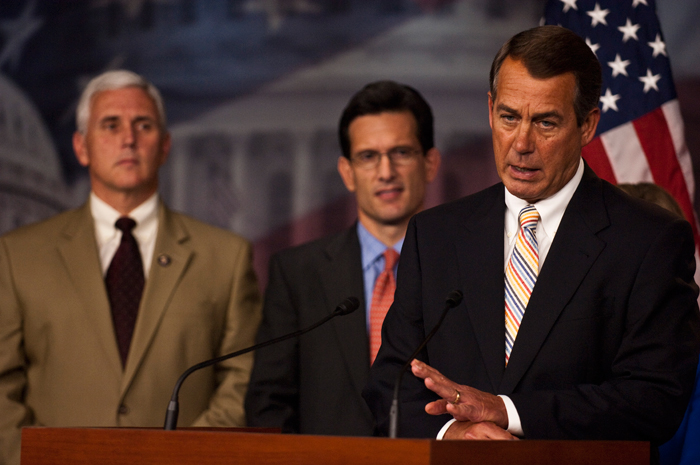Using catchy slogans and scary rhetoric, the Republicans have done a masterful job of painting themselves as the party of austerity and fiscal discipline. “Where are the jobs?” “Runaway deficits.” “Government takeover.” After years of profligacy, they say, they’ve gotten religion, and can be trusted to run the show once again. But scratch lightly and, just below that veneer, you’ll find that nothing has changed at all.
“I’ve admitted that Republicans made their fair share of mistakes when they had the majority in this institution,” said House Minority Leader John Boehner at his weekly press conference yesterday morning. “But I think our members have learned their lessons.”
The lesson, though, is that Republicans were right all along–tax cuts can cure all that ails the country–and that they just fell into a brief trap of allowing too much discretionary spending.
The fight over the stimulus, he said, “was all about more government spending, not more about allowing American families and small businesses to keep more of what they earn, because when it’s all said and done they’re the ones who are gonna have to get the economy going again,” Boehner said, ignoring the fact that about one-third of the stimulus bill’s cost came from tax cuts.
Another reporter asked Boehner if he worried the tax cuts he envisions will deepen deficits. Boehner took a turn on the Laffer curve.
“You equate the idea of lowering marginal tax rates with less revenue for the federal government,” Boehner cautioned. “We’ve seen over the last 30 years that lower marginal tax rates have led to a growing economy, more employment, and more people paying taxes. And if you look at the revenue growth over those 30 years, you’ve got a prime example of what we’ve been talking about.”
This is practically the reverse of the truth. In the years after the Ronald Reagan and George W. Bush tax cuts, economic growth and employment were significantly lower than they were after Bill Clinton’s 1993 tax increases. According to Michael Ettlinger and John Irons of the Center for American Progress, “Over the seven-year periods after each legislative action, average annual growth was 3.9 percent following [Clinton’s 1993 tax increase], 3.5 percent following [Reagan’s 1981 tax cut], and 2.5 percent following [Bush’s 2001 tax cut].”
But beyond the factual contradiction, Boehner appeared to be in denial about the real impact of the Bush tax cuts. Another reporter followed up: “Are you saying that the Bush tax cuts didn’t effect the deficits that we’re in now?”
Boehner halted for a moment, then shrugged: “The reductions in ’01 and ’03 were to respond to an economic problem. ’01 was done before 9/11. ’03 was done in response to what happened to the economy. But that’s not what led to the budget deficit. It’s not the marginal tax rates. If you look at the problem that we’ve got here, it’s a spending problem, that has grown over the last five or six years. A real spending problem. ”
Bush did use the 2001 recession to argue for tax cuts…but only after running for President on a platform of reducing taxes in response to Clinton’s budget surpluses. Tax cuts either way. And as for the latter claim–“that’s not what led to the budget deficit”–the numbers tell a much different story.
Take a look at this graph from the Center on Budget and Policy Priorities.

The Bush tax cuts are in fact the single biggest contributor to the current deficit.
So what, if anything, would Republicans do differently if they got another bite at the apple? The short answer seems to be: very little.










